- Details
-
Category: Mining and Human Rights
-
Published: Tuesday, 29 September 2020 16:30
EuroNews
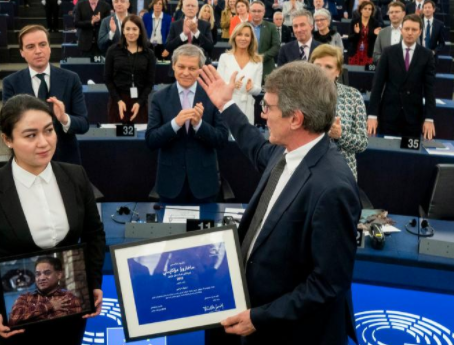
The Parliament awards the Sakharov Prize every year to honour exceptional individuals and organisations defending human rights and fundamental freedoms. In 2019 the prize was awarded to Ilham Tohti, an Uyghur economist fighting for the rights of China’s Uyghur minority. Nominations for the Sakharov Prize can be made by political groups and/or groups of at least 40 MEPs.
The democratic opposition in Belarus, is represented by the Coordination Council, initiative of brave women - main opposition candidate Sviatlana Tsikhanouskaya; Nobel Laureate Svetlana Alexievich; musician and political activist Maryia Kalesnikava; and political activists Volha Kavalkova and Veranika Tsapkala - as well as and political and civil society figures - video blogger and political prisoner Siarhei Tsikhanouski; Ales Bialiatski, founder of the Belarusian human rights organisation Viasna; Siarhei Dyleuski; Stsiapan Putsila, founder of the Telegram channel NEXTA; and Mikola Statkevich, political prisoner and presidential candidate at the 2010 election.
Read more ...
- Details
-
Category: Mining and Human Rights
-
Published: Friday, 25 September 2020 16:28
Jackie McVicar
AmericaMagazine
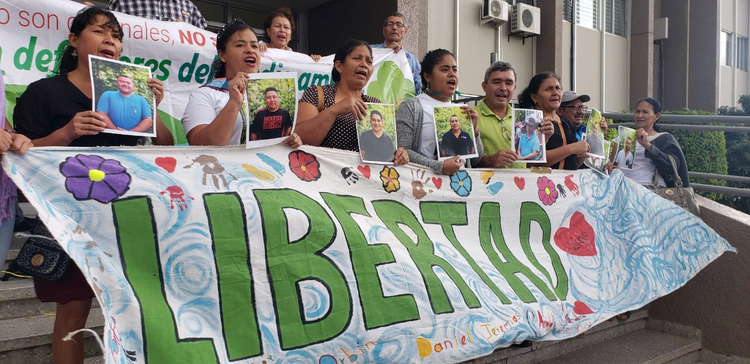
Every Wednesday morning, Gabriela Sorto wakes up early to make lunch for her dad, Porfirio. He has not been convicted of a crime but, along with six other local men from Guapinol, Honduras, he has been held without bail in pre-trial detention for more than a year. The incarcerated men were part of a local campaign to protect water sources in their community.
“He’s in jail for defending the Guapinol and San Pedro Rivers, for defending life,” says the 26-year-old, who has become the public face of her father’s plight. Before his arrest, Mr. Sorto led the family ministry at his parish and worked as a mason. “I’m really proud of him,” Ms. Sorto says.
Due to Covid-19 restrictions, the seven men, plus another who has been in jail since December 2018, have not been allowed a family visit since March. Once a week, their loved ones have special permission to send them a home-cooked meal plus extras like green avocados and tortillas that will help them get through the week.
Read more ...
- Details
-
Category: Regional News
-
Published: Friday, 11 September 2020 16:44
Global Voices
 One of the most essential aspects of COVID-19 prevention is regularly washing your hands; however, hundreds of thousands of Salvadorans are facing COVID-19 without reliable access to water. According to the United Nations, more than 600,000 people did not have access to any type of drinking water and sanitation services in 2016 and more than one million people only had access to deficient water services. According to news reports, this situation has possibly worsened due to the pandemic.
One of the most essential aspects of COVID-19 prevention is regularly washing your hands; however, hundreds of thousands of Salvadorans are facing COVID-19 without reliable access to water. According to the United Nations, more than 600,000 people did not have access to any type of drinking water and sanitation services in 2016 and more than one million people only had access to deficient water services. According to news reports, this situation has possibly worsened due to the pandemic.
Rosa Amelia Mendoza, a 45-year-old mother of three who resides in Colonia Altavista, a municipality about 15 kilometers from downtown San Salvador, has not had any running water in her house since the pandemic started back in March 2020. In fact, she hasn't had any tap water consistently in her home for over two years. On a phone call with Global Voices she said:
“I am afraid for my family, everyone recommends that you wash your hands regularly, just to make sure the virus doesn't get to you. But how can you do that if there is no water to do it with? There is no river or well nearby that we can go carry water, and we don't have the means to pay a water truck regularly. I am not working right now.”
Read more ...
- Details
-
Category: Regional News
-
Published: Thursday, 03 September 2020 20:10
Massay Crisanto - The Nation
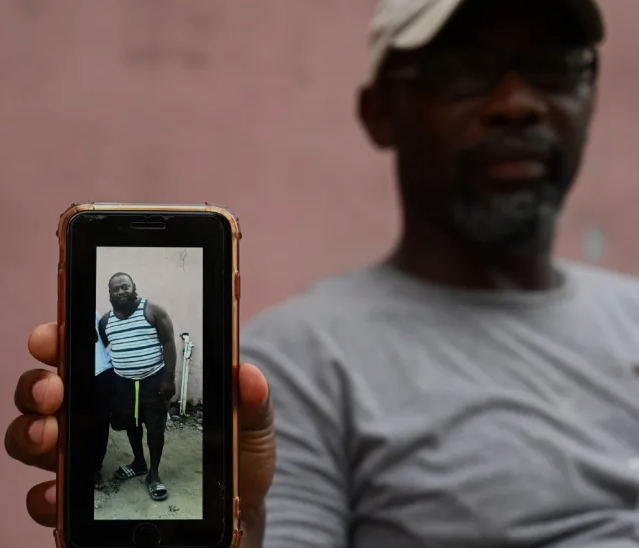 It’s been nearly 50 days since five Garífuna leaders were abducted in their homes in Triunfo de la Cruz, on Honduras’s Caribbean coast. On July 18 at 5:30 AM, men wearing police uniforms kidnapped the five leaders after forcefully invading their homes, breaking windows, tampering with locks, and forcing the Garífuna men—Alberth Centeno, Milton Martínez, Suami Mejía, Gerardo Róchez, and Junior Mejía—out of their homes. They have not been seen since.
It’s been nearly 50 days since five Garífuna leaders were abducted in their homes in Triunfo de la Cruz, on Honduras’s Caribbean coast. On July 18 at 5:30 AM, men wearing police uniforms kidnapped the five leaders after forcefully invading their homes, breaking windows, tampering with locks, and forcing the Garífuna men—Alberth Centeno, Milton Martínez, Suami Mejía, Gerardo Róchez, and Junior Mejía—out of their homes. They have not been seen since.
The men were kidnapped on a Saturday during which the State of Honduras restricted civilian movement due to Covid-19, allowing only state officials, authorities, and health workers to move freely. Relatives of the disappeared leaders claim that heavily armed men with bulletproof vests arrived in pick-up trucks and wearing police uniforms, sowing fear in the community. They first arrived at the home of Alberth Centeno’s father and physically harassed him, demanding that he lead them to his son’s house, where they pulled Centeno out of his bed. They then proceeded to go to the houses of the other Garífuna leaders, smashing doors and windows and physically assaulting relatives who attempted to stop the kidnappings.
Alberth Centeno, 27, is the president of the Triunfo de la Cruz community board and also a member of the Honduran Black Fraternal Organization (OFRENEH). He campaigned for Honduras to fulfill a 2015 ruling by the Inter-American Court on Human Rights (IACHR) that ruled that the government had violated collective ownership rights after it sold Garífuna land to developers without consultation. The judgment demanded that the government compensate the Garífuna community for the territory that had been taken over by foreigners and companies for tourist projects. As of present day, the ruling has yet to be met.
“The Honduran state is creating as many obstacles as possible to avoid complying with the IACHR judgment,” says Naama López, a Honduran lawyer and human rights activist. “The deaths and forced disappearances of these leaders are the most drastic measures used to stop Garífuna organizing so they can eventually hand their territories over to transnational capital.”
Read more ...
- Details
-
Category: Mining and Human Rights
-
Published: Tuesday, 01 September 2020 16:19
Trocaire
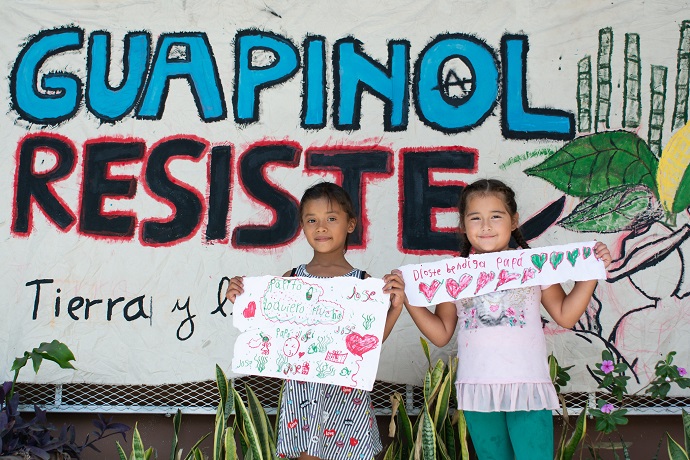 The ‘Guapinol 8’ were detained on 1st September last year for peacefully protesting against the exploitation of their community’s natural resources by private business interests.
The ‘Guapinol 8’ were detained on 1st September last year for peacefully protesting against the exploitation of their community’s natural resources by private business interests.
Two daughters of the imprisoned Guapinol human rights defenders, Liss Jireth Cedillo Zúniga (7) and her friend Cristhel Alejandra Romero Portillo, holding their drawings in front of the Public Ministry in Tegucigalpa, Honduras. The sign in the background says "Guapinol is resisting". Photo: Giulia Vuillermoz
Early in 2018, the crystalline Guapinol River that runs through Carlos Escaleras Mejia National Park, in northern Honduras, turned into a river of mud. The muddied waters could be traced to the activities of a mining company, ‘Inversión Los Pinares.’
Unknown to the communities of Guapinol, the company had been granted a licence by the government to operate in the park despite the fact that the area was protected by law.
Read more ...
- Details
-
Category: Regional News
-
Published: Monday, 24 August 2020 16:51
Institute for Policy Studies
EarthWorks
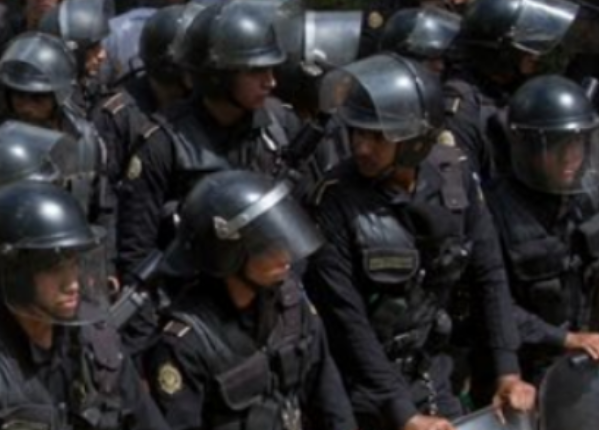 400 million suit against the Guatemalan government. Released today, Mining Injustice Through International Arbitration: Countering Kappes, Cassiday & Associates’ Claims over a Gold-mining Project in Guatemala, examines Kappes, Cassiday & Associates (KCA) attempt to strong-arm the Guatemalan government through international arbitration into green-lighting the unwanted El Tambor gold mine — or compensating the mining firm for hundreds of millions of dollars in future profits it had little hope of ever earning.
400 million suit against the Guatemalan government. Released today, Mining Injustice Through International Arbitration: Countering Kappes, Cassiday & Associates’ Claims over a Gold-mining Project in Guatemala, examines Kappes, Cassiday & Associates (KCA) attempt to strong-arm the Guatemalan government through international arbitration into green-lighting the unwanted El Tambor gold mine — or compensating the mining firm for hundreds of millions of dollars in future profits it had little hope of ever earning.
“KCA bought the project knowing there was social conflict and despite this, they pressured the government to repress us. That’s exactly what happened on May 23, 2014 and how they managed to operate for two years,” remarks Álvaro Sandoval, member of the Peaceful Resistance La Puya that has maintained an encampment outside the mine gates for the last eight years.
“KCA, its subsidiary EXMINGUA, and their Canadian predecessors, took advantage of the legal and institutional leniency of the Guatemalan state toward extractive industries. This, coupled with rampant government corruption and privileged connections allowed KCA to meet its objectives: consolidate the mining project while riding roughshod over community opposition. KCA knew that, at the end of the day, international arbitration could guarantee them millions in profits,” remarked Guatemalan investigative journalist and report co-author Luis Solano.
As the report illustrates, KCA enjoyed immense privileges in Guatemala. The company managed to obtain its operating license despite a mining moratorium and a woefully incomplete environmental impact assessment. It built its mine without a construction license and through violent repression of local communities by private security and state-armed forces under a corrupt government. Unwavering community opposition and legal actions halted the project in 2016. With the company’s leadership under criminal investigation and its mine suspended, KCA turned to Investor State Dispute Settlement (ISDS) under the terms of the Central America-Dominican Republic Free Trade Agreement (CAFTA-DR) with the US.
Read more ...



 One of the most essential aspects of COVID-19 prevention is regularly washing your hands; however, hundreds of thousands of Salvadorans are facing COVID-19 without reliable access to water. According to the United Nations, more than 600,000 people did not have access to any type of drinking water and sanitation services in 2016 and more than one million people only had access to deficient water services. According to news reports, this situation has possibly worsened due to the pandemic.
One of the most essential aspects of COVID-19 prevention is regularly washing your hands; however, hundreds of thousands of Salvadorans are facing COVID-19 without reliable access to water. According to the United Nations, more than 600,000 people did not have access to any type of drinking water and sanitation services in 2016 and more than one million people only had access to deficient water services. According to news reports, this situation has possibly worsened due to the pandemic. The ‘Guapinol 8’ were detained on 1st September last year for peacefully protesting against the exploitation of their community’s natural resources by private business interests.
The ‘Guapinol 8’ were detained on 1st September last year for peacefully protesting against the exploitation of their community’s natural resources by private business interests.